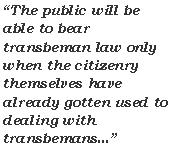Past Imperfect: Ancient Legal Codes and Future Transbeman Law - Precedents, Problems & Paradoxes
Professor Sam N. Lehman-Wilzig
Page 5 of 5
Conclusion: Paradox, Problem & Preferred Policy
Oscar Wilde once said: “when the gods wish to punish us, they answer our prayers.” I would like to conclude with a warning that emerges from my historical analysis – and from there to a policy suggestion.
Let us assume that I am correct and that we will gradually, perhaps even voluntarily, grant increasing rights over time to Transbemans, based on past precedent of various categories of non-human and then sub-human subjects. This very process holds within it a kernel of paradoxical danger, for the principle would then be set for granting special rights to Super-bemans. In other words, once we accept that there exists a gradation of rights based on certain qualities (levels of self-consciousness, intelligence, organic composition, etc.), then any creature that surpassed that baseline could turn around and argue that relative to it, humans deserve fewer rights or it deserves more rights!

Image 5: Danger!
Clearly, legal rights are not necessarily dichotomous – a case of either you have them or you don’t. As I have tried to show, throughout history (including today – the Spanish law does not grant full rights to the Great Apes) we have developed a much more finely nuanced system of “graded rights” depending on who and what we are dealing with. Thus, Transbeman Law could well be a double-edged sword, and despite our personal enthusiasm for the overall phenomenon, we would do well to recall another great British author – William Shakespeare – who warned: ‘Tis the sport to have the engineer / Hoist with his own petard’ (Hamlet, Act 3, Scene 4).
We don’t want to blow ourselves up in the rush to do right with our Transbeman cousins.
What do I suggest then? When I first drew up the outline of this talk I did not have a policy suggestion in mind – which is why you saw the words “Preferred Policy” in the recent slide but not in the paper’s title (in any case, my paper’s title is already so long that I wouldn’t have had any room to put the extra two words on the title slide!). But the more I fleshed out my thoughts, the more I realized that a policy suggestion was called for.

Image 6: 2 Philosophies of Legal Development
Let us return to ancient and medieval law, but this time with a birds-eye view, i.e. the various civilizations’ “philosophy of legal development”. In brief, we can distinguish between the Jewish + Anglo-Saxon approach on the one hand, and the Roman + Modern European Continental approach on the other hand. In simple (perhaps a bit simplistic) terms, the former viewed law  as emanating from social practice. In other words, first we see how customary behavior unfolds in society, how “social life” deals with new phenomena – and only then laws are written to reflect such common practice. We can see here the origins of political democracy, at least in the underlying philosophy. The Roman and Modern Era European Continental approach took the opposite tack: it is the Emperor, King, aristocracy, priesthood, and educated elites who understand better than the masses what needs to be legislated, and so the Law emerges from “On High”, in rational and considered fashion, as opposed to the “messy” approach of Anglo-Saxon and Jewish jurisprudence.
as emanating from social practice. In other words, first we see how customary behavior unfolds in society, how “social life” deals with new phenomena – and only then laws are written to reflect such common practice. We can see here the origins of political democracy, at least in the underlying philosophy. The Roman and Modern Era European Continental approach took the opposite tack: it is the Emperor, King, aristocracy, priesthood, and educated elites who understand better than the masses what needs to be legislated, and so the Law emerges from “On High”, in rational and considered fashion, as opposed to the “messy” approach of Anglo-Saxon and Jewish jurisprudence.
I have no doubt that it is the Common Law approach (in Jewish terminology, the Oral Law and not the Written Law) that has to be applied to the Transbeman phenomenon, because – to  quote a Jewish legal maxim – the law should only be something that the “public can bear”. And the public will be able to bear Transbeman Law only when the citizenry themselves have already gotten used to dealing with Transbemans in day-to-day life and lost whatever fears of the unknown they might have. And in this respect I am quite optimistic, for contemporary social-cybernetic research clearly shows that humans have an almost unlimited ability to anthropomorphize almost any form of non-living stimulus that suggests/mimics an inkling of humanity or sentience (e.g. the AIBO [1] craze). If we let society gradually get used to the phenomenon and then develop Transbeman Law – in many cases based on other laws from the far and more recent historical past – the transition to Transbeman society will be that much smoother. Any attempt to legislate from on high will probably cause a political and jurisprudential backlash. As we used to say: “easy does it”. Not only does it get done if you take it slow and easy, but first we have to “do it” (social behavior) and then the legislation becomes easy.
quote a Jewish legal maxim – the law should only be something that the “public can bear”. And the public will be able to bear Transbeman Law only when the citizenry themselves have already gotten used to dealing with Transbemans in day-to-day life and lost whatever fears of the unknown they might have. And in this respect I am quite optimistic, for contemporary social-cybernetic research clearly shows that humans have an almost unlimited ability to anthropomorphize almost any form of non-living stimulus that suggests/mimics an inkling of humanity or sentience (e.g. the AIBO [1] craze). If we let society gradually get used to the phenomenon and then develop Transbeman Law – in many cases based on other laws from the far and more recent historical past – the transition to Transbeman society will be that much smoother. Any attempt to legislate from on high will probably cause a political and jurisprudential backlash. As we used to say: “easy does it”. Not only does it get done if you take it slow and easy, but first we have to “do it” (social behavior) and then the legislation becomes easy.
(hopefully not) The End
Footnote
1. AIBO - (Artificial Intelligence roBOt, homonymous with "partner" in Japanese) is one of several types of robotic pets designed and manufactured by Sony; there have been several different models since their introduction in 1999.
http://en.wikipedia.org/wiki/AIBO August 3, 2007 5:43PM EST
Bio
 Professor Sam Lehman-Wilzig is Chairman of the Department of Political Studies at Bar-llan University, ISRAEL.
Professor Sam Lehman-Wilzig is Chairman of the Department of Political Studies at Bar-llan University, ISRAEL.
His areas of expertise are:
- Mass communication (Journalism, advertising and public relations);
- Influence on education, society and politics;
- Information (Post-industrial) society & politics; prediction, planning and public policy making;
- Israeli politics (especially political communication, public protest and alternative socio-economic systems.
Books co-edited:
- Comparative Jewish Politics: Public Life in Israel and the Diaspora;
- Stiff-necked People, Bottle-Necked System: The Evolution and Roots of Israeli Public Protest, 1949-1986;
- Stiff-necked People, Bottle-Necked System: The Evolution and Roots of Israeli Public Protest, 1949-1986;
- Israeli Public Protest, 1949-1992;
- Israeli Public Protest, 1949-1992;
- WILDFIRE: Grassroots Revolt in Israel in The Post-Socialist Era;
- THE USEFUL GUIDE TO COMMUNICATIONS: A Handbook of Theory and Practice for Journalism, Advertising and Public Relations; and
- Mil’khamitz [Hebrew] Non-academic